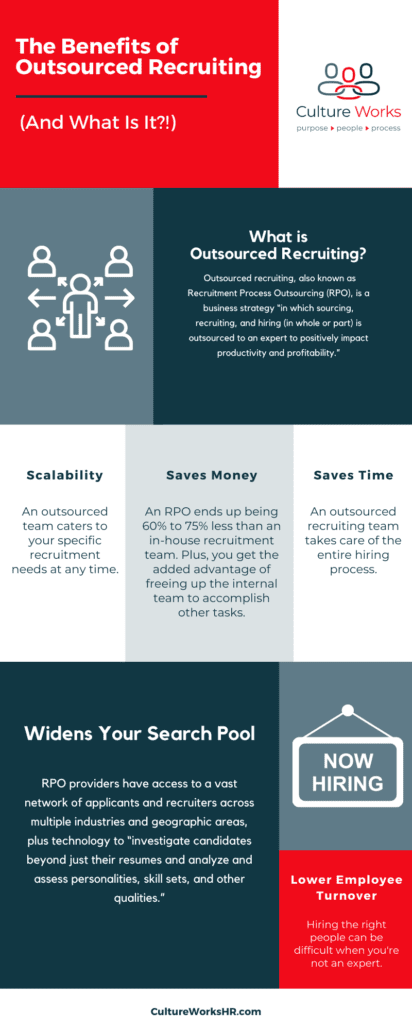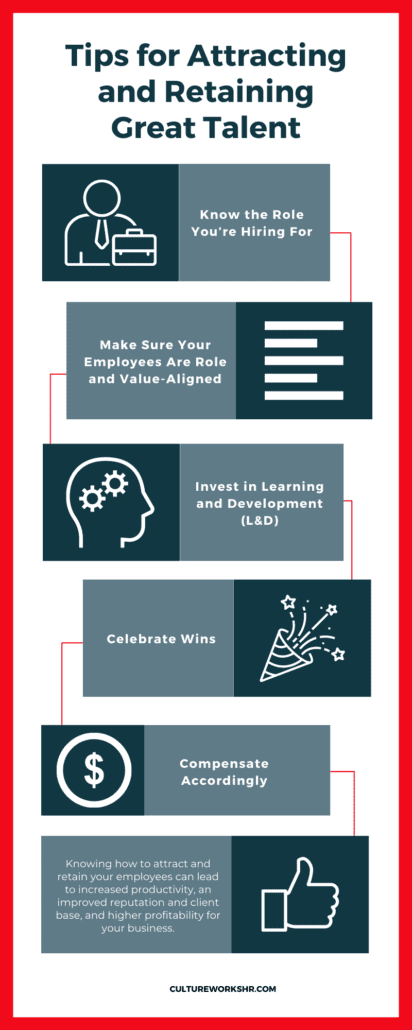One of the most important parts of your business is the people you hire. Having the right set of people on your team is key for any business to be successful, productive, and efficient—but it’s often easier said than done.
Finding the right employees who fit not only their roles but also your company culture can be a challenging and lengthy task. Read on to learn about outsourced recruiting: what is it and what are the benefits?
Let’s dive in.
What is Outsourced Recruiting?
First things first, what is outsourced recruiting? Outsourced recruiting, also known as Recruitment Process Outsourcing (RPO), is a business strategy “in which sourcing, recruiting, and hiring (in whole or part) is outsourced to an expert to positively impact productivity and profitability.”
There are many reasons why a company might turn to outsourced recruiting. Forbes writes that many companies do so when they don’t have the resources on hand to support their talent sourcing needs. Other reasons for outsourcing your recruiting include:
- Cutting down on costs
- Increasing your search pool
- Decreasing employee turnover
- Saving time
- And more!

What are the Benefits of Outsourced Recruiting?
Outsourced recruiting might be a great option for your business. But how can you know for sure? Below we’ve listed five benefits of outsourced recruiting.
Save Money
There isn’t an employer out there who wouldn’t like to cut costs when possible. Outsourced recruiting, similar to any other type of business process outsourcing, costs a fraction of what hiring an in-house recruitment team would cost.
RPOs typically charge:
- Monthly management fee
- Sporadic transactional fees (when filling individual positions)
All in all, research shows that ”the total cost of an RPO ends up being 60% to 75% less… plus you get the added advantage of freeing up the internal team to accomplish other tasks.”
It’s a win-win for everyone!
Widen Your Search Pool
By outsourcing your recruiting, you widen your search pool tenfold. Think: It’s what RPOs specialize in.
RPOs use a variety of tools to find the best fit for your business’s open positions, including:
- Sourcing candidates on their own
- Employee referral programs
- Company career sites
- And more
RPO providers have access to “a vast network of applicants and recruiters across multiple industries and geographic areas,” according to this G&A Partners. They also have the technology to “investigate candidates beyond just their resumes and analyze and assess personalities, skill sets, and other qualities.”
Lower Employee Turnover
An employer’s worst nightmare is spending time and money training a new employee, just to have them quit or be let go shortly after.
As an employer, you want the lowest rate of employee turnover possible. Why? Well, low turnover increases both productivity and profitability.
We recognize that hiring can be difficult when it’s not your primary job or focus. It can be hard to weed out subpar applicants on your own, which might include those who are underqualified or unmotivated.
If employee turnover is a concern of yours, outsourcing a team of experts might be a great option for your business.
Save Time
An outsourced recruiting team takes care of the entire hiring process.
This means:
- Writing job descriptions
- Candidate screening
- Improving hiring manager satisfaction
- Employee branding
By outsourcing your recruiting, you give yourself more time to focus on what’s really important: running your business!
Scalability
One of the best things about hiring an outsourced recruitment team is that they can cater to your recruitment needs at any time. For example, if you need to ramp up employment during the holiday season or over the summer, RPO offers this flexibility.
Interested in learning more about the best recruiting strategies in 2022? Read on for the New Year hiring trends that we’re looking out for. Or, visit our website to learn more about our hiring process at Culture Works.



